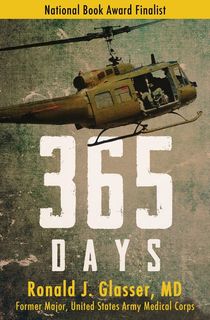58,000 American soldiers died in the Vietnam War—less than half the number killed in World War I and little more than one-eighth of those who perished in World War II.
Yet the story of our 20-year involvement in Vietnam—from the arrival of the first American military advisors to the Gulf of Tonkin Incident to the Tet Offensive to the frantic retreat from the US embassy as communist tanks rolled through the streets of Saigon—has arguably had a bigger impact on the American psyche than any other war.
Like every great tragedy, it is a tale of illusions shattered, of heroes toppled from great heights, of seemingly small decisions that led to catastrophic consequences. No wonder, then, that the American experience in Vietnam has produced such a rich body of literature.
These 15 Vietnam War books range from darkly comic war fiction to devastating battlefield memoir and astute historical analysis—each one casts a brilliant light on the inscrutable conflict.
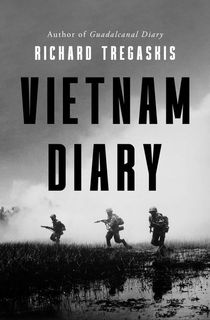
Vietnam Diary
Vietnam Diary is the first work of its kind, offering an on-the-ground account of the war and the American troops involved. From the #1 New York Times-bestselling author of Guadalcanal Diary, war correspondent Richard Tregaskis documents new techniques that were employed against guerrilla forces, making this book essential reading for anyone interested in the period.
Moving across Vietnam, Tregaskis introduces the many players involved, including the Marine helicopters, the ground pounders, the special forces, and more, while following along on missions. He shares untold stories from these men who are deeply committed to fulfilling their duty.
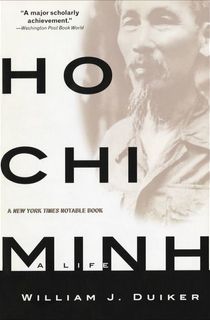
Ho Chi Minh
Selected as a New York Times Notable Book and a Los Angeles Times Best Book of the Year, Ho Chi Minh unravels the complex life of a man recognized for founding modern Vietnam. To understand the conflict to come and its consequences, author and famed war scholar William J. Duiker offers revolutionary findings into Ho’s intentions.
Though Ho Chi Minh helped shape the twentieth century as we know it, before this book, there was no major biography of his life. It is, as such, recognized as “[a] major scholarly achievement” and a “a welcome intrusion on the silence that has surrounded Ho Chi Minh” (Washington Post Book World; Los Angeles Times Book Review).
By focusing on recently declassified archives, Duiker paints the story of a man from a small village who would come to stand alongside the world’s key players, including Joseph Stalin, Sun Yat-sen, Harry Truman, and others.
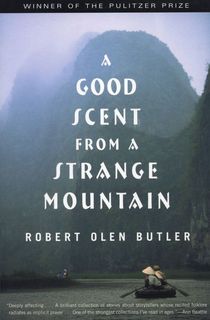
A Good Scent from a Strange Mountain
In this Pulitzer Prize-winning collection of stories, author Robert Olen Butler considers the aftermath of the Vietnam War and its lasting effects on the Vietnamese population. Bridging Vietnamese folklore and the experiences of Americans, Butler creates a vivid, moving landscape—from the jungles to the battlefield.
In these stories, “Butler’s achievement is not only to reveal the inner lives of the Vietnamese, but to show, through their eyes, how the rest of us appear from an outside perspective” (Chicago Tribune).
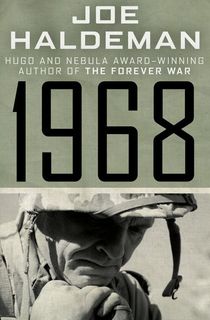
1968
From the Hugo and Nebula Award-winning author of The Forever War comes a moving novel about a war that not only changed America’s relationship with combat but also transformed those involved—both directly and indirectly.
Drawing on his own experience in the military, author Joe Haldeman tells the story of John “Spider” Spiedel, a college dropout who is drafted, and his girlfriend, Beverly, who, back in America, revolts against the war and what it stands for.
During a tumultuous time in U.S. history, Haldeman turns towards some of the most affected, the soldiers and those they love, in a “powerful novel” (Booklist)
365 Days
From the perspective of an army doctor involved comes a harrowing account of the Vietnam War’s human toll. In 1968, he was enlisted as a serviceman and sent to Japan to work at the US Army hospital. Originally charged with the children of officers and government officials, soon thousands of soldiers would arrive each month in need of tending.
Ronald J. Glasser tells the story of seventeen of his patients, men who are hurting and just waiting to go home. In “a book of great emotional impact,” and a National Book Award finalist, discover a war literature classic that casts a spotlight on the devastating impacts of war.
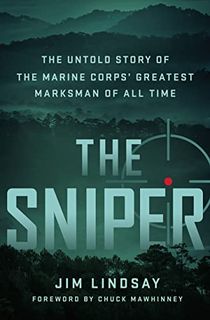
The Sniper: The Untold Story of the Marine Corps' Greatest Marksman of All Time
Charles "Chuck" Mawhinney made history as the deadliest—and youngest—sniper in the Marines. He joined the Corps in 1967, at age 18, and recorded 103 confirmed kills in just 16 months during the Vietnam War. Afterwards, he quietly retired and tried to move on with his life, but was thrust into notoriety when a fellow sniper discussed his record in a book.
He then embarked on a new career training servicemen and lawmen in the art of long-distance shooting. Jim Lindsay’s gripping account, created with Mawhinney’s full cooperation and including a foreword written by him, explores the sniper’s wartime experiences as a very young man in one of the most dangerous Vietnam combat zones.

The Things They Carried
A staple of high school and college classrooms, and arguably the most influential work of fiction to emerge from the war, this novel-in-stories blends memory and imagination to reveal essential truths about the combat experience.
Author Tim O’Brien served as an infantryman in Vietnam and had already written two acclaimed books based on his experiences: the memoir If I Die in a Combat Zone and the National Book Award-winning novel Going After Cacciato. But The Things They Carried, whose central protagonist shares a name and a similar biography with its author, is his masterpiece.
By making the relationship between fact (“happening-truth”) and fiction (“story-truth”) one of the novel’s central themes, O’Brien brilliantly captures the fractured nature of a conflict whose unreality—for American soldiers on the ground as well as their friends and families watching on TVs a world away—was its defining characteristic.

Dispatches
Even if you’ve never read this blistering work of New Journalism, it likely formed your impression of the Vietnam War. Author Michael Herr co-wrote the screenplay for Full Metal Jacket and contributed the narration to Apocalypse Now—elements from his reporting made it into both iconic films.
Herr arrived in Vietnam on assignment from Esquire in late 1967, just before the siege of Khe Sanh and the Tet Offensive. He embedded with American troops, traveling without restrictions to document the war as it was actually being fought in the field. By his own account, he was terrified most of the time.
He returned home and spent 18 months working on the manuscript before a nervous breakdown forced him to put it aside for nearly 10 years. When Dispatches was finally published in 1977, The New York Times Book Review offered this memorable description: “It’s as if Dante had gone to hell with a cassette recording of Jimi Hendrix and a pocketful of pills: our first rock-and-roll war, stoned murder.”

Fields of Fire
Straightforward, brutal, and honest, Fields of Fire lacks the literary ambition of The Things They Carried and the psychedelic poetry of Dispatches, but more than makes up for it by pulling readers headfirst into the mud, heat, and terror of combat in Vietnam.
Few, if any, war novels are more visceral or intense, as author James Webb, who earned a Navy Cross for his heroism in Vietnam and served one term as a U.S. Senator from Virginia, eschews politics and psychology to present a grunt’s eye view of the war.
Thrown into the hellhole of An Hoa Basin in 1969, his three protagonists from very different backgrounds are forced to set aside their misinformed expectations and learn the savage art of survival. Over the course of their tour of duty, these naive young Marines become fierce, battle-scarred warriors—but at what terrible cost?
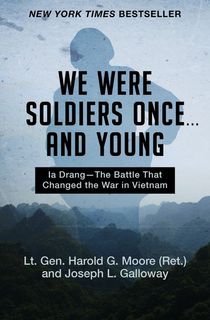
We Were Soldiers Once . . . and Young
In November 1965, Lt. Gen. Harold G. Moore led the 1st Battalion, 7th Cavalry into the U.S. Army’s first significant battle of the Vietnam War. Arriving by helicopter at LZ X-Ray in the remote Ia Drang Valley, Moore’s 450 men were immediately surrounded by nearly 2,000 North Vietnamese soldiers.
With the help of air power and heavy artillery bombardment, the Americans won a tactical victory after four days of intense fighting, but a separate force at LZ Albany, a short distance away, wasn’t so lucky—the 2nd Battalion, 7th Cavalry, fighting under quarters too close to call in air support, was brutally slaughtered. Only half of its soldiers made it out alive.
Moore and Joseph L. Galloway, the only journalist on the ground throughout the fighting, interviewed hundreds of combatants from both sides and reviewed after-action reports and captured documents to tell the complete story of the Battle of Ia Drang. We Were Soldiers Once, which was made into a 2002 film, is both the most accurate account of battlefield tactics in Vietnam and a harrowing portrait of the devastating emotional impact of modern warfare.

The Best and the Brightest
There is no better source for understanding how America got involved in Vietnam than this #1 New York Times bestseller. Full of revealing anecdotes—from Gen. William Westmoreland eating breakfast in his underwear “in order to keep his fatigues pressed” to the first thought that popped into Lyndon Johnson’s head when gunshots rang out in Dallas: “The Communists did it.”
This account also offers sketches of key foreign policy figures, including Secretary of State Dean Rusk, National Security Advisor McGeorge Bundy, and Secretary of Defense Robert McNamara. The Best and the Brightest documents each pivotal step along the way to the point of no return.
Halberstam, who had served as a correspondent in Vietnam and written a previous book, The Making of a Quagmire, about the subject, finds that some of America’s finest thinkers, trained in the country’s most elite schools, “had, for all their brilliance and hubris and sense of themselves, been unwilling to look and learn from the past."

A Bright Shining Lie
Neil Sheehan was a 26-year-old foreign correspondent newly arrived in Vietnam when he first met Lieutenant Colonel John Paul Vann, a military advisor to the South Vietnamese Army. Vann disagreed with the Pentagon’s strategy of indiscriminate bombing and forcible relocation of peasant villages, but was ignored by his superiors—so he began leaking critical information to the press corps, Sheehan included.
Forced into retirement, Vann became a hero to those who had grown skeptical of the war. His return to Vietnam in 1965 complicated his legacy as he took part in the controversial Phoenix Program and became the first civilian to lead U.S. regular troops in combat before his death in a helicopter crash.
But it was learning about the hidden scandals of Vann’s personal life that sent Sheehan on a 16-year mission to write A Bright Shining Lie. Winner of the Pulitzer Prize and the National Book Award, the book offers a riveting, often angry look at the war through the lens of a tarnished hero who represented both the best and the worst of the American experience in Vietnam.

A Rumor of War
Raised in the blue-collar suburbs of Chicago, Philip Caputo joined the Marine ROTC because his life had been full of “security, comfort, and peace,” and he “hungered for danger, challenges, and violence.” He found them in spades in Vietnam, where he arrived after basic training as an officer in the first combat unit sent into the country.
Caputo and his rifle company endured long marches in stultifying jungle heat, elephant grass that cut through their uniforms, and the constant terror of trip wires, sniper fire, and ambushes. Conditions were so bad, and so far removed from their training, that they “began to feel like ghouls”.
Eventually, Caputo faced a court-martial when his order to capture two Vietcong soldiers resulted in the murder of two innocent civilians; the charges were dropped, but Caputo admits that “something evil had been in me that night.” A Rumor of War is his poetic and devastatingly honest account of how that “something evil” got there.
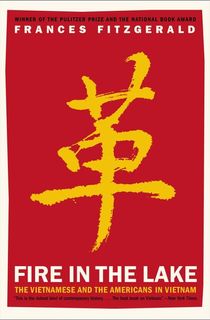
Fire in the Lake
Freelance journalist Frances FitzGerald spent six years in Vietnam and called Fire in the Lake—which won the Pulitzer Prize, the National Book Award, and the Bancroft Prize—“a first draft of history”. Taking her title from the I Ching’s image for revolution, FitzGerald argues that the American involvement in Vietnam was doomed to failure by fundamental misunderstandings between the two countries.
The US, in reacting to the spectre of communism, failed to account for Vietnam’s 1,000-year history of resisting foreign invaders and incorrectly assumed that American-style democracy would appeal to a culture based on tradition and ancestor worship. Forced from their homes by search-and-destroy missions and relocated to shantytowns, millions of peasants became more, not less, susceptible to the ideology of the National Liberation Front.
Nowadays, FitzGerald’s clear-eyed, articulate, and empathetic analysis is accepted wisdom—but it hit US bookshelves like a shock wave when it was first published in 1972, helping to mainstream anti-war sentiment and putting pressure on the Nixon administration to withdraw US troops.

The Sorrow of War
Often compared to Erich Maria Remarque’s All Quiet on the Western Front, this haunting novel from the other side of the war follows Kien, the only survivor of the Glorious 27th Youth Brigade, on a postwar mission to collect the corpses of his North Vietnamese comrades from old battlefields and give them a proper burial.
Confronted with “a parade of horrific memories,” Kien slips between the past and the present as the novel’s stream-of-consciousness narration documents his tragic love affair with his childhood sweetheart, Phuong; his traumatizing combat experiences; and his struggles to make sense of his wrecked life through his writing.
Based closely on author Bảo Ninh’s biography, The Sorrow of War was officially banned in Vietnam for 10 years after its initial publication in English, but bootleg copies of the translation sold briskly. Since its official Vietnamese publication, The Sorrow of War has been a bestseller.
This post is sponsored by Macmillan. Thank you for supporting our partners, who make it possible for The Archive to continue publishing the history stories you love.
Featured image: Wikimedia Commons

